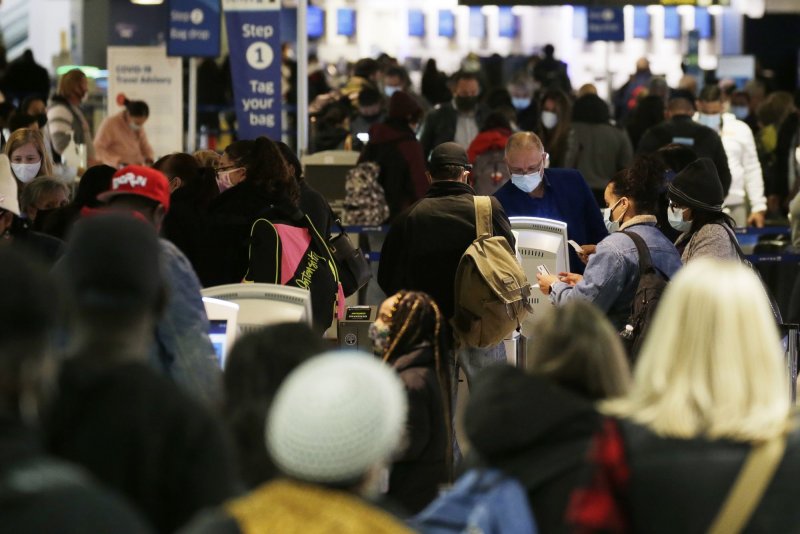1 of 5 | Travelers arrive and check in for a flight at Newark International Airport in Newark, N.J., in November. File Photo by John Angelillo/UPI |
License Photo
WASHINGTON, Oct. 19 (UPI) -- With the United States set to join the European Union and Canada in reopening its borders for vaccinated travelers in November, people in countries with limited access to COVID-19 immunizations face significant hurdles that federal officials should address quickly, migration experts said Tuesday.
Nearly 60 countries, mostly in Africa and the Middle East, had not been able to vaccinate more than 10% of their population by September, according to a World Health Organization report. The Our World in Data project at the University of Oxford predicted that most African countries will miss the WHO's goal to vaccinate 40% of the population by the end of the year.
"A lot of people traveling from low-income countries already face lots of challenges in getting a visa," Meghan Benton, research director at the Migration Policy Institute, said at a panel discussion Tuesday at the Brookings Institution. The vaccine requirement "only exacerbates the inequality in the global traveling system."
She suggested providing vaccines during the visa application process or after travelers arrive at their destinations instead of rejecting all unvaccinated travelers.
"We need to think about enabling infrastructure rather than simply enforcement," Benton said.
Other experts on the panel said access to vaccines is only one of the problems people from low-income countries face.
"Even if you can access vaccines, can you get the documentation that can then be verified? How are data handled in countries where people have trusting issues with their governments?" said Elizabeth Collett, a senior adviser to the Migration Policy Institute.
Benton said in an interview there is "a big question mark" on what kind of vaccine verification system the U.S. government will propose, especially because states and cities differ in how they handle verification, such as accepting digital or print vaccination cards.
On Nov. 8, the United States will lift the almost two-year travel suspension on 33 countries, including China, Iran and most European countries for those who are vaccinated. In the past two years, people who weren't U.S. citizens could not enter America if they had been to one of the other countries in the 14 days prior to their proposed arrival in the United States.
The Centers for Disease Control and Prevention has said that vaccines approved by the Food and Drug Administration and the World Health Organization will be accepted as proof of vaccination. The list includes vaccines developed by Pfizer-BioNTech, Moderna, Johnson & Johnson, Oxford-AstraZeneca (and Covishield), and China's Sinopharm and Sinovac vaccines.
Foreign travelers with mixed doses of approved vaccines from different manufacturers will be admitted. The FDA recommendation for Americans to receive mixed doses is expected this week.
The American borders are also opening up to Canada and Mexico in early November to vaccinated non-essential travelers, which include tourists and those visiting friends and family. Essential workers from those countries may enter the United States without proof of vaccination until January.
Last week, the Biden administration warned Moderna to increase its global vaccine distribution and noted that the firm has received $10 billion in federal funds for vaccine development.
"I think these companies understand our authorities and understand we would not be afraid to use them. But the best recourse right now is for them to step up to the plate now," David Kessler, the Biden administration's chief science officer for the COVID-19 response, said last week at a Yale Law School event.
Benton said putting people into two categories -- vaxxed and non-vaxxed -- obscures the more important need to increase vaccination rates globally.
"We should stop thinking about preventing people from coming in but how to facilitate vaccine access worldwide," she said.















